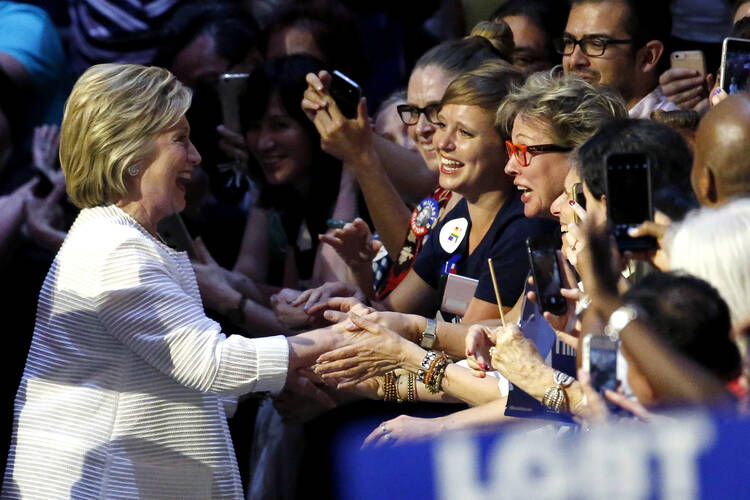With big victories in the California and New Jersey primaries on Tuesday, Hillary Clinton became the first woman in American history to clinch a major-party presidential nomination—32 years after Democrats nominated Geraldine Ferraro for vice president, which had led many to believe that a woman at the top of the ticket was just around the corner. That corner was a lot farther off than it seemed. Since Ferraro’s nomination, we’ve seen a woman serve as Speaker of the House, three women (including Clinton) serve as secretary of state and three women named to the Supreme Court (following the groundbreaking appointment of Sandra Day O’Connor in 1981).
Only a handful of women have even attempted to run for president over the past few decades, and no woman even won a seriously contested primary until Ms. Clinton’s first narrowly unsuccessful campaign in 2008. The Atlantic’s Peter Beinart writes that her victory this year “constitutes the greatest political comeback by a presidential candidate since Richard Nixon won the Republican nomination in 1968, after losing the presidential election of 1960.” Perhaps the better comparison is to Ronald Reagan, who came tantalizingly close to winning the Republican nomination in 1976 and never stopped running until he made it to the White House four years later. This year represents a reversal of roles for the two major parties: The Democrats tend to go for fresher faces (Jimmy Carter, Barack Obama), but this year it’s the Republican Party taking a gamble on an outsider candidate.
A future sign of progress may be, well, not necessarily a female version of Donald Trump, but more women candidates with the audacity to run even when they’re not the most experienced in the field. (Why did Ms. Clinton face a primary challenge from Sen. Bernie Sanders rather than Sen. Elizabeth Warren? Neither senator has a strong grasp on foreign policy, but I suspect men are more likely to think they can get away with learning on the job.) The nomination of Ms. Clinton may help fight what’s been called “election aversion” on the part of women, or their tendency to be under-confident in their ability to hold elected office—even when there’s evidence that voters and journalists overall are not biased against women candidates. But Ms. Clinton had many advantages in her 2016 primary campaign, including hundreds of millions of dollars in campaign contributions, near-universal support from Democratic officeholders and her status as the wife of a former president. The question is whether her success as a candidate, and possibly as a president, will embolden women without such resources to run for office.
With her nomination in hand, Ms. Clinton is now focusing on presumptive Republican nominee Donald Trump. The demographics favor Ms. Clinton; as Republican Sen. Lindsey Graham said four years ago of his own party, “We’re not generating enough angry white guys to stay in business for the long term.” It would be unfortunate if the fall campaign denigrated into tribalism, with each political party turning out their own zip codes and whipping up resentment of the Other.
Mr. Trump, of course, has shown little hesitation to pit ethnic and religious groups against each other—the latest example being his assertion that a judge of Mexican ancestry can’t be impartial in a lawsuit against Trump University. But the Democrats should resist the temptation to seek a comeuppance for “angry white guys” this November, and Ms. Clinton should not only celebrate the breaking down of racial and gender barriers but also promise voters that she will try to boost economic opportunity in all corners of the nation. “I’m With Her” is a great slogan for raising money and energizing volunteers, but at a time of intense political polarization and a widespread belief that the country is on the wrong track, Ms. Clinton should make it clear that she will work for the common good, including those who weren’t with her from the beginning.
Ms. Clinton’s victory speech on Tuesday night is encouraging in that regard. After paying tribute to the struggle for women’s equality in the United States, she celebrated our “big-hearted, fair-minded country” and returned to the “it takes a village to raise a child” theme (for which she’s been ridiculed by opponents since the 1990s). “We’re stronger when we respect each other,” Ms. Clinton told the crowd in Brooklyn, “listen to each other and act with a sense of common purpose.” That shouldn’t be a controversial message, but it seems to be meeting uncommon resistance this year.








